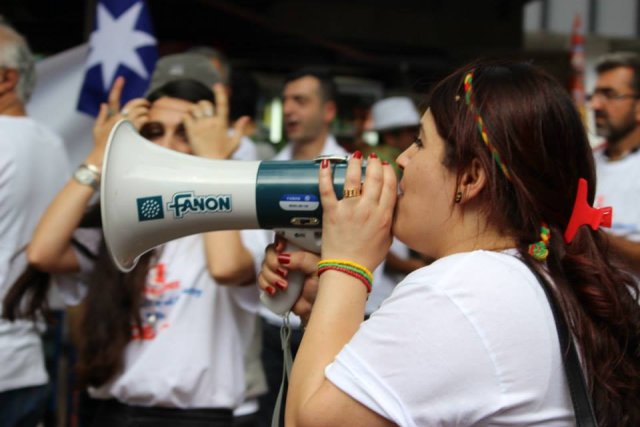
In an article in the Guardian on October 28, Antony Loewenstein says that he does not write about feminism because he fears being “attacked by women for questioning a consensus position on feminist issues”.
“Writing about feminism when male is like gate crashing a party,” he said, “and I’m concerned I’ll be slammed for daring to arrive without an invitation.”
He confesses that he is more afraid of feminist “opprobrium” than the death threats and bile he routinely suffers from Zionists who object to his (very good) work exposing Israel.
Loewenstein is obviously no shrinking violet yet he is terrified of feminists. And he tells us many men are, and that is why they do not speak out on gender issues.
He has been roundly and, I think, quite fairly criticised on social media for this claim. The “scary feminist” trope is straight out of the men’s rights activist playbook and jars very nastily when it comes from someone with progressive politics.
His article makes some important points about the dominance of mainstream feminism ― the type that uncritically lauds former PM Julia Gillard ― in the, well, mainstream.
I agree with Loewenstein that it sure would be great to see more left-wing feminism in the Herald Sun. But he was not the only one to notice that Gillard introduced cuts to supporting parent payments on the same day she gave her famous “misogyny” speech. Single mothers noticed, and they are still noticing.
It would be very sad if Loewenstein, or any left-wing feminist man, was prevented from advocating for women’s rights by “vicious attacks” from scary women like me. A column in the Guardian is a great platform and women could certainly use some support on a few things.
So here are a few suggestions for topics I think he will find will go down better than a lecture on how scary, “staid” and mainstream feminists are, complete with some helpful leads and sources.
1. The Stop Targeting Aboriginal Women campaign was launched by Sisters Inside from their "Is Prison Obsolete" conference in Brisbane last month.
The conference featured an extraordinary array of First Nations women speakers and survivors of incarceration, and featured international speakers such as former Black Panther Angela Davis.
The conference endorsed the national day of protests against deaths in custody on October 23 that mourned the death of Ms Dhu in Western Australia and pledged to renew the fight against the criminal injustice system.
A good source of commentary on this and other issues for Aboriginal women in Australia is the Black Feminist Ranter, Celeste Liddle. Also check out Flat Out and their Centre for the Human Rights of Imprisoned People for other leads.
2. No Shelter is a “collective against feminist violence” fighting the current mass closures of women’s shelters by the New South Wales government.
This issue is not reported on much in the mainstream press but you’ll find the New Matilda’s Wendy Bacon and Green Left Weekly have covered the issue extensively.
3. No More Deaths is a coalition of domestic violence crisis agencies that is campaigning to put violence against women on the agenda for the Victorian election.
Members of the coalition have suffered successive federal and state funding cuts despite mainstream rhetoric of concern over Australia’s epidemic of domestic violence. Have a look at the current campaign by the Aboriginal Family Violence Prevention Legal Service in Victoria which faces closure due to federal cuts.
4. A key concern for working-class feminist activists in Australia today is liveable incomes and public housing for single mothers and their children. Perhaps start with the hardworking Council of Single Mothers and their Children and the incredible community at Parenting Payments for Parents Not Newstart.
Kate Borland would be a good source on public housing and women.
McAuley Community Services for Women rallied outside the Victorian parliament recently explaining that women and children escaping violence face homelessness and destitution.
5. And finally, how about something on the phenomenal rise of feminists from Middle Eastern backgrounds in Australia today?
I thought Randa Abdel-Fattah, Anne-Azza Aly, and the Muslim women in the audience, wiped the floor with Justice Minister Michael Keenan on the ABC’s Q & A last month.
The Middle Eastern Feminist, run by Kurdish women, or Ruby Hamad are good starting points.
Women from the Kurdish Association in Victoria spoke at a Green Left Weekly forum in Melbourne on women's liberation and the Kurdish revolution. They have a fascinating story to tell. Their Australian organisation has adopted the same anti-sexist organisational policies as Kurdish forces in Syria and Turkey.
A new generation of young Kurdish Australian women are stepping into leadership roles. They are currently raising funds to support the tens of thousands of refugees who have fled the city of Kobane to escape the Islamic State.
In doing this they risk federal police raids for so-called "terrorism" offences.
Of course, there are a thousand other stories too. A fear of feminists is not the main reason these important stories take a backseat to more middle-class concerns in the mainstream media.
As others have pointed out, there might be other reasons these issues get ignored. It would be great if Loewenstein could help give some of these issues the attention they deserve.
Like the article? Subscribe to Green Left now! You can also like us on Facebook and follow us on Twitter.